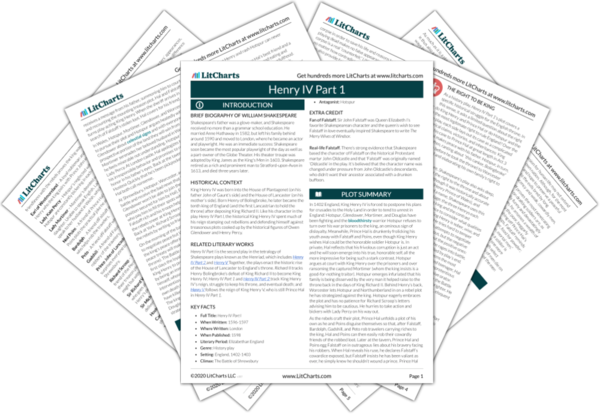Appearances
By playing constantly with characters’ appearances, Henry IV Part 1 asks questions about the difference between appearance and essence—about the difference between what a character seems to be and what that characters is—and about the possibility (or impossibility) of concealing one’s true character. The play opens with King Henry’s lament that his son Prince Hal does not seem to be princely material at all, which leads the king to wonder whether his Harry (Prince…
read analysis of AppearancesHonor
Throughout the play, characters pursue honor even while they also ask questions about the nature of honor and wonder about its value. Prince Hal’s trajectory through the play transforms him from a fun-loving teenager into a mature prince and is described in terms of honor: he goes from a position of dishonor at play’s start (where King Henry laments his recklessness and wishes he could embody the honor of young Hotspur) to a…
read analysis of HonorThe Right to be King
As a history play, Henry IV Part 1’s plot covers a specific historical struggle for the English throne. In this sense, it asks a limited question about the right to be king: do King Henry and Prince Hal or do Hotspur and the rebels have the most legitimate right to rule England? Over the course of the play, each side lays out its case as a complicated series of historical claims, victories, and inheritances…
read analysis of The Right to be King
Language
Like every one of Shakespeare’s plays, Henry IV Part 1 explores language: its power to inspire action, to transform attitude, to reveal a character, and to conceal one. Prince Hal’s character transformation is initially expressed not by actions but by words: he confides to the audience in an aside that his essential nobility will cancel out his wild appearance. Soon after, he describes his remorse for the past and ambition for the future to…
read analysis of LanguageWarfare
Like many of Shakespeare’s history plays, Henry IV Part 1 builds towards a critical, throne-determining battle at play’s end. Knowing the historical facts of the story, the audience already knows how this battle is going to turn out. Still, Shakespeare uses the circumstances leading up to the fighting and the conditions of the battlefield itself to offer deeper meditations on warfare, applicable to any battle at any point in history. Many of these meditations intertwine…
read analysis of Warfare






